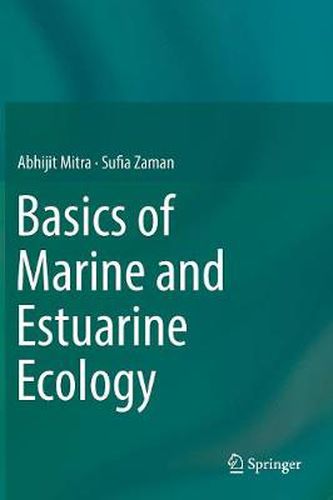Readings Newsletter
Become a Readings Member to make your shopping experience even easier.
Sign in or sign up for free!
You’re not far away from qualifying for FREE standard shipping within Australia
You’ve qualified for FREE standard shipping within Australia
The cart is loading…






This title is printed to order. This book may have been self-published. If so, we cannot guarantee the quality of the content. In the main most books will have gone through the editing process however some may not. We therefore suggest that you be aware of this before ordering this book. If in doubt check either the author or publisher’s details as we are unable to accept any returns unless they are faulty. Please contact us if you have any questions.
The book presents recent research on marine ecology in different parts of the world. It aims to shed light on relevant topics for budding marine ecologists.
The blue soup of Planet Earth, which comprises both biotic and abiotic components, is essential to keeping the wheel of civilization running. Four major ecosystem service categories have been identified within this context, namely provisioning services such as water, food, mangrove timber, honey, fish, wax, fuel wood, fodder and bioactive compounds from marine and estuarine flora and fauna; regulating services such as the regulation of climate, coastal erosion, coral bleaching and pollution; cultural services encompassing recreational (tourism), spiritual and other non-material benefits; and supporting services such as nutrient cycling and photosynthesis. These valuable services are obtained from various resources that must be conserved for the sake of humanity. This book presents data for each resource type, not just in the form of a simple description, but also through case studies that resulted from several research projects and pilot programs carried out in different parts of the world. Statistical tools were also used to critically analyze the influence of relevant hydrological parameters on the biotic community. Advanced research in marine and estuarine ecology is based on the use of sophisticated instruments, sampling precision, statistical tools, etc., which have also been highlighted in the book.
$9.00 standard shipping within Australia
FREE standard shipping within Australia for orders over $100.00
Express & International shipping calculated at checkout
This title is printed to order. This book may have been self-published. If so, we cannot guarantee the quality of the content. In the main most books will have gone through the editing process however some may not. We therefore suggest that you be aware of this before ordering this book. If in doubt check either the author or publisher’s details as we are unable to accept any returns unless they are faulty. Please contact us if you have any questions.
The book presents recent research on marine ecology in different parts of the world. It aims to shed light on relevant topics for budding marine ecologists.
The blue soup of Planet Earth, which comprises both biotic and abiotic components, is essential to keeping the wheel of civilization running. Four major ecosystem service categories have been identified within this context, namely provisioning services such as water, food, mangrove timber, honey, fish, wax, fuel wood, fodder and bioactive compounds from marine and estuarine flora and fauna; regulating services such as the regulation of climate, coastal erosion, coral bleaching and pollution; cultural services encompassing recreational (tourism), spiritual and other non-material benefits; and supporting services such as nutrient cycling and photosynthesis. These valuable services are obtained from various resources that must be conserved for the sake of humanity. This book presents data for each resource type, not just in the form of a simple description, but also through case studies that resulted from several research projects and pilot programs carried out in different parts of the world. Statistical tools were also used to critically analyze the influence of relevant hydrological parameters on the biotic community. Advanced research in marine and estuarine ecology is based on the use of sophisticated instruments, sampling precision, statistical tools, etc., which have also been highlighted in the book.